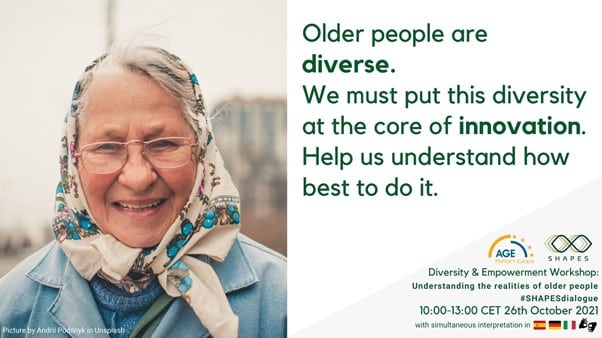
On 26 October, we organised the 4th Dialogue Workshop of SHAPES under the title “Diversity and empowerment: understanding the realities of older people”.
The workshop brought together 176 participants from academia, health and care, civil society and older self-advocates. They expose the lived realities of older people and people with disabilities to bring SHAPES closer to them. The underpinning philosophy is at the core of SHAPES: only if close to people’s wishes will technologies be useful for people.
SHAPES is an EU-funded research project that is developing an open platform with technological solutions for healthier ageing in Europe.
In order to increase participation and ensure accessibility, the workshop had interpretation intro international sign language, Spanish, German and Italian, as well as written scripts.
Older people and people with disabilities have their say
The workshop gave the word to self-advocates who delivered powerful testimonies.
“Older persons are portrayed as causing a tsunami in care. But most of us live independently! During COVID we were even described as dead wood”, declared Joke de Ruiter as the first to take the floor. Joke is self-advocate and committed to AGE’s work via the European Women’s Network in the Netherlands.Her words were a passionate call to identify and put an end to ageism in policies, services and social practices: “When I became 75 I discovered my insurance price had increased. I hadn’t had a single accident over the decades! It changed just because of my age. For older people society uses the word ‘still’. ‘Can she still drive?’, ‘can she still go out?’. Avoid it please!”. Her statement included a call to value older people’s role in society: “What if us, older people, stopped the work we are doing voluntarily, just for one day? Then maybe society would realise how big our contribution is!”.
Sanja Tarczay, from the World Federation of the Deafblind (WFDB), shared her experience as a person with disabilities: “Many people ignore the reality of deafblindness. They ignore even more the barriers as we age with deafblindness. As we grow older, there is not enough support available. And 2/3 of deafblind people are older!”. Mark Wheatley, from the European Union of the Deaf (EUD), said that “barriers that deaf people face as they age are even bigger. To address them, ask older people themselves: experiences, issues. Work with them! Social isolation is a huge problem and we need to tackle it”.
SHAPES researchers meeting older people
In order to inform the development of the project with the realities of older people, SHAPES researchers have been conducting a study that includes interviews with older people across Europe. The workshop included a presentation of these #SHAPESstories. They reflect older people’s diverse needs, expectations and wishes. They point to the importance of connection, inclusion and participation.
The stories, shared by the researchers who conducted this work, illustrated older people’s expectations around technologies. They showed how much these can empower older people, if well designed and if they respond adequately to people’s wishes.
Bringing research and policymaking together for positive change
The last panel of the workshop gave the voice to initiatives external to SHAPES that can contribute to a Europe where older people live better. Lotan Kraun, from the TRANS-SENIOR EU-funded Marie Curie programme, presented the concept of his research on empowering older people in transitions between care services. Valentina Polylas, from the European Regional and Local Health Authorities (EUREGHA), presented the work of their members. She highlighted how important innovation is to inform policymaking; possibilities to explore synergies between SHAPES and EUREGHA’s members were identified, including using SHAPES’ outcomes to inform policymaking and to bring them to life in care systems.
“We are working hard with our partners to make sure we close the potential gaps between the realities of older people and the technologies we design”, highlighted AGE’s Secretary-General, Maciej Kucharczyk in his closing remarks. He encouraged all participants to challenge their own mindsets: “Let’s call our own thoughts and attitudes into question to make sure what we do and say helps everyone live as equals!”.
A more detailed workshop report, as well as news about SHAPES and next workshop – in April 2022 – are available in SHAPES website: www.shapes2020.eu






